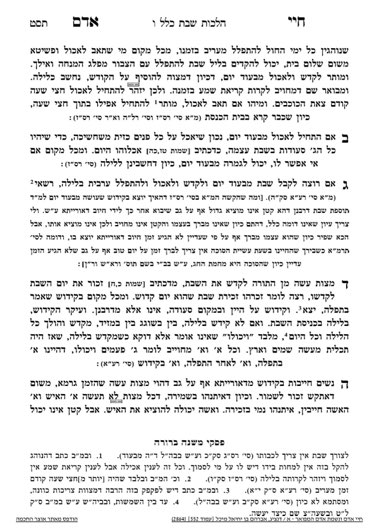The current series, which will cover Maariv on Friday night and Kiddush, is available for sponsorship. Please contact Rabbi Reingold for more information.
We are beginning siman 5. The Chayei Adam writes that women are chayav in kiddush mideoraysa, just like men. This is a chiddush, because kiddush is a mitzvas asei shehazman grama (a time-generated mitzvah), and the general rule is that women are patur from such mitzvos. He explains that the Torah makes a hekish from which we learn that they are chayav.
A hekish is when the Torah writes two different halachos in the same pasuk, with the obvious implication that they must be in the same pasuk in order to teach us something. Alternatively, a hekish can be between two pesukim which are joined together with a vav, an “and”, which again indicates the connection between them. The concept of hekish is a halacha leMoshe miSinai, and it therefore has the status of a deoraysa. It was clearly explained to Moshe that this is one of the many ways through which to learn the Torah. When two pesukim are adjacent to each other, but without a vav {“and”), they are known as “semuchim”, near [each other]. The Gemara brings a machlokes whether pesukim which are semuchim are learned from one to the other.
Regarding the chiyuv kiddush for women, in Parshas Yisro, the Torah uses the term zachor to refer to our keeping of Shabbos, and in Parshas Devarim, the Torah uses the term shamor. These pesukim are describing exactly the same dibbur of Hashem, yet each uses a different description. Chazal understand that they both apply to the understanding of the pasuk, and telling us that anyone chayav in zachor, which refers to the avoiding transgressing the mitzvos lo saasei, is chayav in shamor, the positive mitzvos. Thus, now that we have an exception to the concept of mitzvas asei shehazman grama, we return to the standard, which, in this case, indicates that both men and women are chayav in kiddush.
Since we have learned that the level of chiyuv of both men and women is equal, we understand that a woman can fulfill the chiyuv for herself. On the other hand, a katan cannot be motzi a woman. In other scenarios, a katan is allowed to fulfill a chiyuv for their parent, but over here, where we just learned that kiddush is a chiyuv deoraysa, a katan cannot help. Cases in which a katan can be motzi an adult regard mitzvos derabanan, in which the child also has a chiyuv derabanan (chinuch) so he can be motzi an adult.
The Chayei Adam earlier pointed out that according to the Magen Avraham, if a person davens maariv, they are yotzei the chiyuv kiddush on a Torah level. If so, theoretically a woman could daven maariv, and then her chiyuv is only a chiyuv derabanan., and she can employ a katan to be motzi her. However, the Chayei Adam clarifies that even in this case, a woman cannot have a katan motzi her, because her chiyuv derabanan is stronger than the chiyuv of chinuch.
We need to clarify the age at which a child can be motzi his mother with kiddush. Although one may have thought of a bar mitzvah could be motzi, it is not so simple. We know that the status of halachic maturity is not just about reaching a certain age, but reaching a certain level of physical maturity. The Gemara explains that if a person has reached the age of halachic maturity (12/13), we can assume they have the physical simanim as well. However, we only rely on this assumption for derabanan issues, not deoraysa issues. We will clarify this question further, be’ezras Hashem.
Summary
Women are chayav mideoraysa in kiddush, just like men. Therefore, a katan cannot be motzi a man or woman in kiddush.



